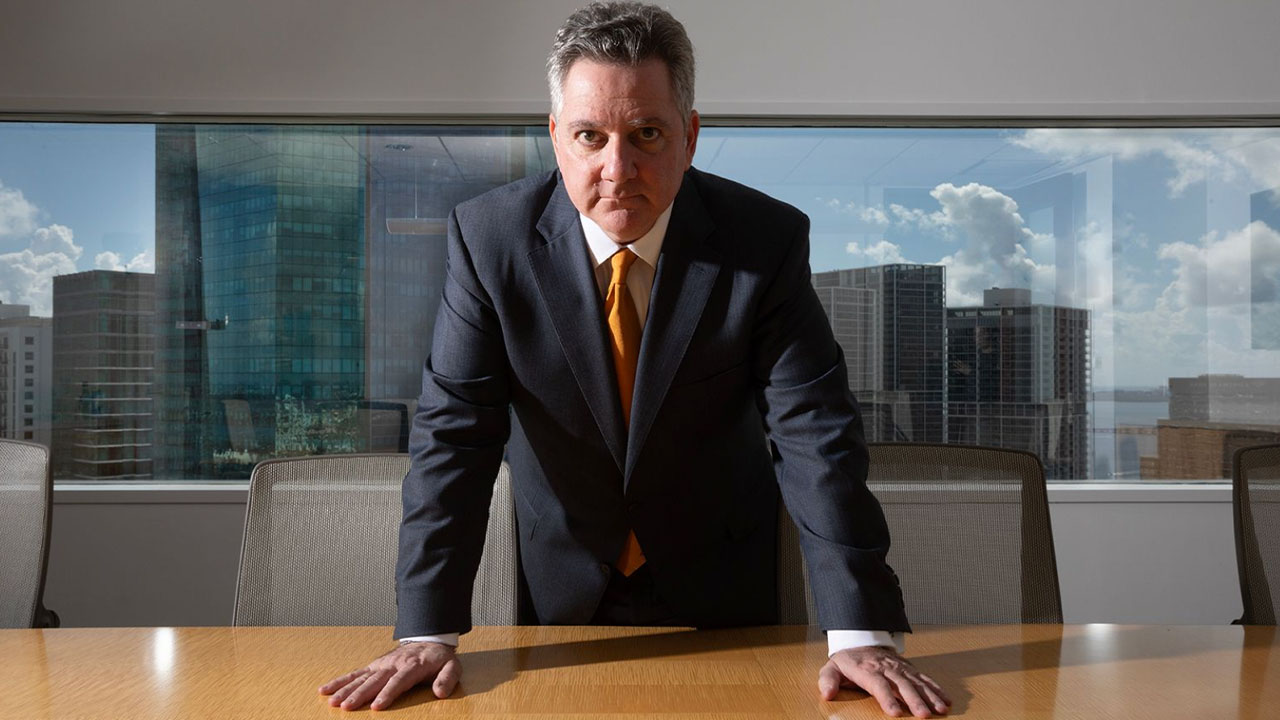Bernie Madoff. Lou Pearlman. And, yes, the Ponzi scheme’s namesake, Charles Ponzi. These are all household name fraudsters. But, each year, millions upon millions of dollars are lost at the hands of schemes that seemingly sneak up on the most unsuspecting of victims. According to Barron’s, in 2022 alone there were 57 new Ponzi schemes discovered encompassing $5.3 billion in investor funds.
Jeff Schneider is the founding partner of LKLSG in Miami, where he is engrained in the high-stakes world of receiverships, international arbitration and business litigation. Throughout his three-decade career, he has served as a receiver in actions brought by the Security and Exchange Commission, Office of the Attorney General and other government entities, helping recover more than $400 million for victims of Ponzi schemes. Schneider discusses the ways in which South Florida is rife with Ponzi-like activity, the red flags locals should be aware of, and some of his most memorable moments in the receivership space.
Why is South Florida such a thriving spot for these schemes?
I think it’s two-fold. Number one, there used to be a lot of seniors in Florida. Elderly folks living on a fixed income who were trying to make ends meet, were typically the most vulnerable. What I also see is that your typical protagonist of a fraud will spend the fruit of their fraud. That means big homes, cars, boats and a lavish lifestyle, and I think it’s simply practical to be in [South Florida]. If you are living that kind of a lifestyle, in Minnesota, for example, you’re going to stick out like a sore thumb. If you are in Miami and you have a couple of Ferraris and a 55-foot yacht, you’ll blend in.
Are there any trends in these schemes that you’re seeing or anything that folks in South Florida should really keep an eye on?
Every one of these cases is exactly the same in that they are robbing from proverbial Peter to pay Paul. There was a time when medical equipment was the hot item for these frauds. There was a time when insurance policies were the hot item. EB-5 programs were big a couple of years ago. Those were particularly easy because they were largely unregulated by the government and involved foreigners unable to read complex documents in a language foreign to them. I would guess some version of cryptocurrency will be the new fraud of the day. But the bad guys are very clever and creative and they will usually come up with a new bright shiny object that catches people’s attention. In terms of what to look out for, first, if you’re being promised returns of 25% a month, that is absolutely unattainable. It may be something that happens once in your lifetime. If it is happening consistently, that is almost definitely a fraud. So, if it sounds too good to be true, it probably is. Secondly, read documents carefully, and if you don’t understand what you’re reading, hire a lawyer.
Tell us about a couple of the most notable schemes you’ve had to deal with firsthand.
The protagonist in a recent medical equipment case was selling the same group medical equipment over and over again and using new investor money to pay global return to older investors. I also dealt with viaticals in a couple of different cases. This was 20 years ago when there were a lot of AIDS patients and they were unfortunately passing, so they were abdicating their insurance policies. What the fraudsters figured out is that they could simply dummy up the life expectancy form and continue to engage in the fraud. There’s still a big billion dollar-plus case in South Florida that is going on in some form today because it was so large and so complicated.
As a receiver, how are you helping the average Joe out there?
When victims stop receiving their promises on return, they usually start to call the Attorney General, SEC or the FCC and they lodge complaints. Those agencies will issue subpoenas, conduct an investigation and eventually they will conclude a fraud is occurring. They will file an action in court, and because of all these assets that you have out there and all these related companies with funds, they need to remove the bad guy and put someone in place to take over the operation. That person is called to receive it. That person is an agent or arm of the court. At its core, a receiver becomes essentially everything and takes over all the operations and, at first, grabs hold of everything so that the status quo is maintained during the pendency of the actions.
From here, how do you see the Ponzi scheme landscape trending?
By definition, they’re trends, and I could never predict what’s going to be trendy tomorrow. The bad guys are almost always very, very bright. In fact, so bright that I often say if only they had used their powers for good, they easily could have generated the same wealth legally if they just tried.
Photo by Alexia Fodere














